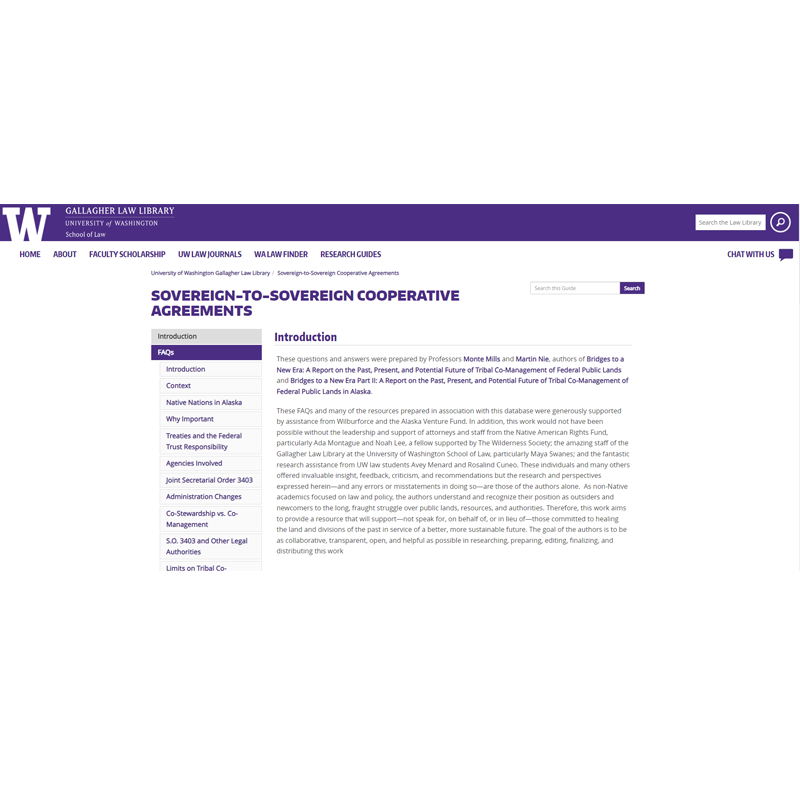
Sovereign-to-Sovereign Cooperative Agreements, (S2S) is a new, free, online resource at the University of Washington Law Library. It houses co-management and co-stewardship agreements by which Tribal Nations and U.S. government agencies are forging new ways to collaboratively care for the land. The concept of “co-stewardship” is novel, and a consolidated repository of information was needed to help agencies and Tribes determine how best to use them, if at all.
Collecting the types of agreements and their authorizing authorities into one easy-to-use repository allows for quicker understanding of the potential they hold to address land use conundrums like managing wildfire, improving wildlife habitat, and supporting sustainable hunting and gathering. The agreements shared have allowed Tribes and agencies to co-steward federal public lands and further nation-to-nation relationships. When used well, co-management agreements have the potential to protect treaty rights and ensure Native American peoples’ access to important religious, subsistence, and cultural interests while providing agencies with needed tribal expertise and Indigenous knowledge.
Some criticize efforts to co-steward or co-manage because they have not consistently created truly equal relationships. After outreach to tribal representatives and agencies, the concept of “Sovereign-to-Sovereign Agreements” was identified as a preferred term because it better describes efforts to form respectful relationships around shared desires to improve land-use practices. The online repository is possible thanks to the collective work of many to better include Indigenous voices in land management decisions. The effort builds on the spirit of thought leaders such as Margery Hunter Brown, Raymond Cross, Charles Wilkinson, Robin Wall Kimmerer, David Getches, John Echohawk, Ralph Johnson, and many others in hopes of working towards a future where Native and non-Native people can work in concert to benefit the land.
“As we enter an era of shared responsibility and meaningful engagement in managing public lands, information on co-management and co-stewardship is critical for tribal governments and the federal government to make informed decisions that not only safeguard but, at their best, bolster tribal sovereignty,” said NARF Fellow Noah Lee (Ho-Chunk Nation).
The Native American Rights Fund (NARF) and The Wilderness Society collaborated with the University of Washington and the University of Montana to organize and make available the large amount of co-management information available. Informed by Native perspectives on data sovereignty, the collection was created with the support of several organizations, like the University of Washington Law Library, the First Nations Development Institute (FNDI), and the Natural Resources Defense Council (NRDC). With Wilderness Society funding, NARF compiled materials such as Executive and Secretarial Orders, statutes, and regulations, sample agreements, academic research, and practice guidance. A significant contribution to the repository is a set of ‘Frequently Asked Questions’ developed by Professors Martin Nie of the University of Montana and Monte Mills of the University of Washington. It answers questions such as: Why use cooperative agreements? What happens if there is a change in the administration? What is co-stewardship vs. co-management?
“The repository consolidates and organizes information on co-management/sovereign-to-sovereign agreements, so practitioners are more able to accomplish the unique land management goals shared by federal agencies and those indigenous to the lands,” said NARF Staff Attorney Ada Montague Stepleton.
Repository feedback is welcome at uwnalc@uw.edu.
More blog posts

